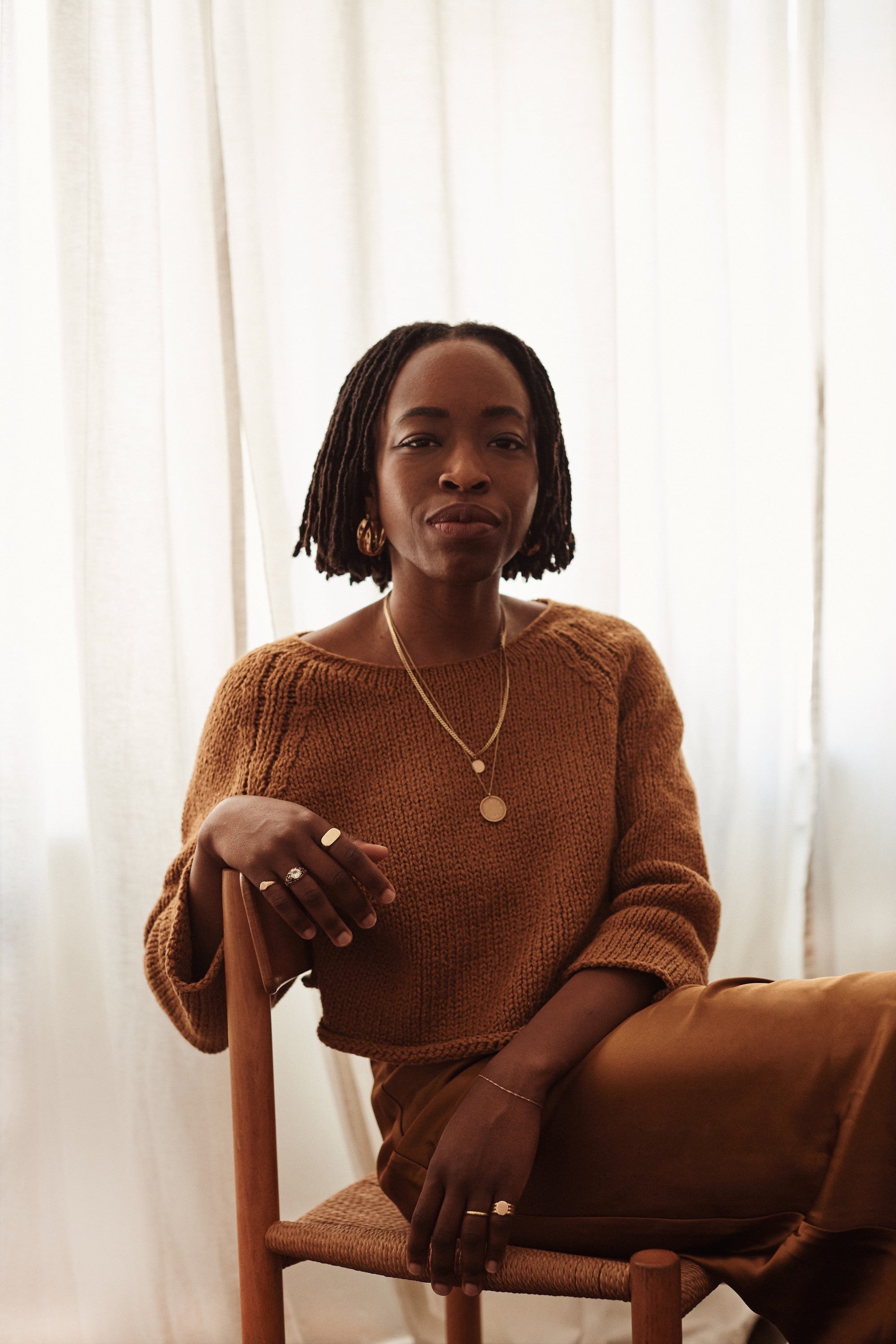Erica Chidi Cohen is barefoot, cradling newly bought plants in her Los Angeles home. Her living room is filled with light and music—the kind you want to Shazam, but don’t because it wouldn’t be chill of you. Look closely, and the educator, doula, and author’s home is decorated with the symbols and talismans of her path. A displayed newspaper ad about abortion rights, books on culture, and gender, and history. A wide scope for a woman whose mission and purpose is equally far-reaching—reproductive justice and education for all.
As the co-founder and CEO of LOOM, Chidi Cohen offers classes in periods, sex, fertility, pregnancy, parenting, miscarriage, and more. Having begun her practice as a volunteer doula in the Bay Area prison system, her work is crucially inclusive, social-justice minded, and genuinely empowering. It’s also beautifully branded and accessible—a rare combination that’s seen LOOM, and Chidi Cohen herself, profiled everywhere from Women’s Health, Vogue, goop, The New York Times, The Cut, and Marie Claire. The thing is, LOOM is just getting started. The goal? “To get LOOM into every home,” says Chidi Cohen. “And really change the health education paradigm.” No biggie.
But one thing Chidi Cohen’s never been asked about, or spoken openly about, is cannabis. Now, recovering from a surgical treatment for uterine fibroids—in which cannabis was a salve—there’s no time like the present.  Jerico Mandybur: Where does your mind go when you hear the word “cannabis” these days?
Jerico Mandybur: Where does your mind go when you hear the word “cannabis” these days?
Erica Chidi Cohen: I think for me, medicine, pleasure, curiosity, and criminalized are the words that come to mind. The word criminalized particularly resonates because being a black person, I understand how differently cannabis has affected our communities. Now that the country is rapidly moving towards mass legalization and the media is celebrating cannabis, things are shifting, but there's still a lot of work to do to create more parity between what's happened in the past and where we need to go.
It's a whole constellation. As soon as you say one, you have to say the others.
Yeah.
What's your earliest memory of engaging with cannabis? How has your relationship with it changed?
When I first had cannabis, I lived in South Africa. I remember being in high school and I remember having too much. I definitely saw it more as a fun thing that was adjacent to a party. My relationship rekindled and expanded with cannabis when I moved back to California in my mid 20s. That was a decade ago, and that was when I got introduced to different strains and also started to realize when was the most appropriate time for me to use it. It stopped being an external social lubricant and became a more private self-care tool for relaxation and pain management, particularly when I moved from inhalants or smokeables into topicals and edibles, I found a really nice sweet spot.
I had a major surgery earlier this month. I had a bunch of uterine fibroids treated using a procedure called Acessa. Fibroids are typically non-cancerous muscle tumors. Most women will have at least one by the time they are 50, but they disproportionately affect black women in their 20s and 30s. My periods were pain-free thanks to supplements and diet, but they were super heavy thanks to the fibroids. The fibroids also caused a lot of pain and bloating of my abdomen during the luteal phase of my cycle because the tumors would expand temporarily and then shrink slightly after my period was over. Papa & Barkley’s tincture and balm really helped manage the discomfort during that time, along with my buckwheat heat pack.
How, if at all, are you hearing about, or speaking to people, about their relationship with cannabis when it comes to their reproductive issues either because of pain management or things that come up during pregnancy?
When we're just thinking about reproductive health in general—periods, sex and perimenopause or menopause—I think cannabis can be helpful for pain management. There's some pretty interesting research that's out there about that. Not a lot, but a little bit. When it comes to fertility and pregnancy, people need to be mindful that excessive cannabis use can suppress a hormone called luteinizing hormone. When luteinizing hormone is suppressed, it can delay ovulation, and when ovulation is delayed, you don’t have a period. Longer cycles and less ovulation predictability can make fertility or getting pregnant more complicated. If someone is like, “I don't get a regular period.”, and they're using a lot of cannabis, that might be something to consider.
I can't sanction the use of it during pregnancy because there is research out there that shows us that some of the outcomes are not that favorable. Postpartum, if you're choosing to breastfeed or chestfeed, keep in mind that there is the capability for cannabis to pass through to the baby via your breastmilk or chestmilk, and cannabis can have a suppressive effect on lactation aka your milk supply.  It’s such a crazy time for cannabis right now, where millions of people are behind bars for having or selling it, but others are being lauded in magazines. It feels like a crucial time. It reminds me of climate crisis, like, if we don't make things work in an equitable way right now, it's going to be too late. That's not a question, but how do you navigate the complexities of all this stuff? We want to be able to celebrate it and advocate for it, but I also feel like how much are we complicit in mainstreaming it in a way that's then going to compromise access or equity even more?
It’s such a crazy time for cannabis right now, where millions of people are behind bars for having or selling it, but others are being lauded in magazines. It feels like a crucial time. It reminds me of climate crisis, like, if we don't make things work in an equitable way right now, it's going to be too late. That's not a question, but how do you navigate the complexities of all this stuff? We want to be able to celebrate it and advocate for it, but I also feel like how much are we complicit in mainstreaming it in a way that's then going to compromise access or equity even more?
As cannabis becomes more ubiquitous, there has to be some levelling out. Maybe it’s wishful thinking, but there needs to be an overhaul of the legal infrastructure to help support systemic change. The fact that we have people, primarily black people, that are incarcerated for either utilizing cannabis or selling cannabis in light of where the industry is going, feels like something that has to be ratified for sure.
Maybe one of the biggest problems right now, in terms of the optics of cannabis, is that it's not nuanced in any way.
No, it's not.
It's like “Cannabis for all!” And that’s very scary if you're somebody or you know somebody—and I think we all do—who's been negatively affected by it.
Totally.
I don’t know if huge billboards and celebratory marketing efforts around recreational use impact the stigma. They might even feed into it because then a lot of people are like, “Whoa. Why is this drug suddenly OK, or suddenly a medicine that we should all just take every day and not think about dosage or the method?”
I think the more information and data there is about usage and correlation, the better. That's going to help people make the most informed choice and help rehab the perception of the actual plant and help highlight the medicinal properties and potential risks. People need to know both in order to support healthy use. Too much of any good thing can be bad.
As for big recreational companies, they should get organized around legalization, criminal justice reform, environmental restoration, and social impact efforts within communities negatively impacted by cannabis legislation.  On a more personal level, how do you work with cannabis, in helping your clients?
On a more personal level, how do you work with cannabis, in helping your clients?
Again, it's always a personal choice. If a client expresses interest in cannabis products, I always lead them to the lowest rung of the ladder to begin their own exploration if they haven't already. I usually recommend topicals to start.
Aside from that, do you have any other advice for how people should start?
I think for me, the ladder is always: start topical. A bath product, balm, or lotion or gel, and then sublingual tincture or tab—something that, again, you can let go through your digestive system so that you're going to have a slower release over time. And then you could move on to an inhalant, if that feels like what you want. Some people are smoke averse. So that's typically the trajectory I recommend for people.
I’m really a fan of THC and CBD mixed together. That, to me, is where it's at. To really be able to feel cannabis working, you need both of those. They're synergistic. Just finding something that's more CBD-rich in its ratio is a good starting point as opposed to a 1:1 of CBD to THC. I think for some people, a 1:1 can really knock you off your feet. Sometimes for me, triple the amount of CBD to THC can be nice. A 3:1 can be really good.
On the synergistic thing, it's so vital that people know that. There's so many CBD brands now that aren’t full-spectrum. Which is fine, but it’s not going to give you the full benefits of the plant. There’s no getting around that.
CBD is being lauded as the more “appropriate” cannabis experience. People feel if it's psychoactive somehow, it becomes illicit or bad. Not to say that there's anything wrong with CBD isolate, it can have anti-inflammatory benefits, but you’re probably going to experience more full-spectrum efficacy when CBD and THC are paired.
Sometimes people start these pure CBD brands and it’s almost like feeding into the stigma. Their whole schtick becomes, “It’s not pot, it’s not pot, don’t worry!”
That's the psychology we need to begin unwinding. What is wrong with pot? There still seems to be this perception that people who use cannabis can’t be highly effective people or positively contribute to society.
And if you didn't have those preconceptions before, then those brands could potentially pass them to you by saying that. So, thanks for nothing.
Yeah, exactly!
What brands do you want to shout out? You mentioned Papa & Barkley. We love them too.
Love them. Vertly’s CBD bath salts and Poplum’s Cold Therapy Hemp Rub are also go-to staples for me. Dosist’s Calm Pen forever and Kiva, particularly their chocolate covered blueberries. Those are really nice. It's just a nice body high, which always feels good to me. I love Weekenders. Have you heard of them? They're a small husband and wife owned pre-roll company and they're based here in LA. Their chill blend is just this perfect balance of CBD and THC.
I have to try.
Yes, you should!






